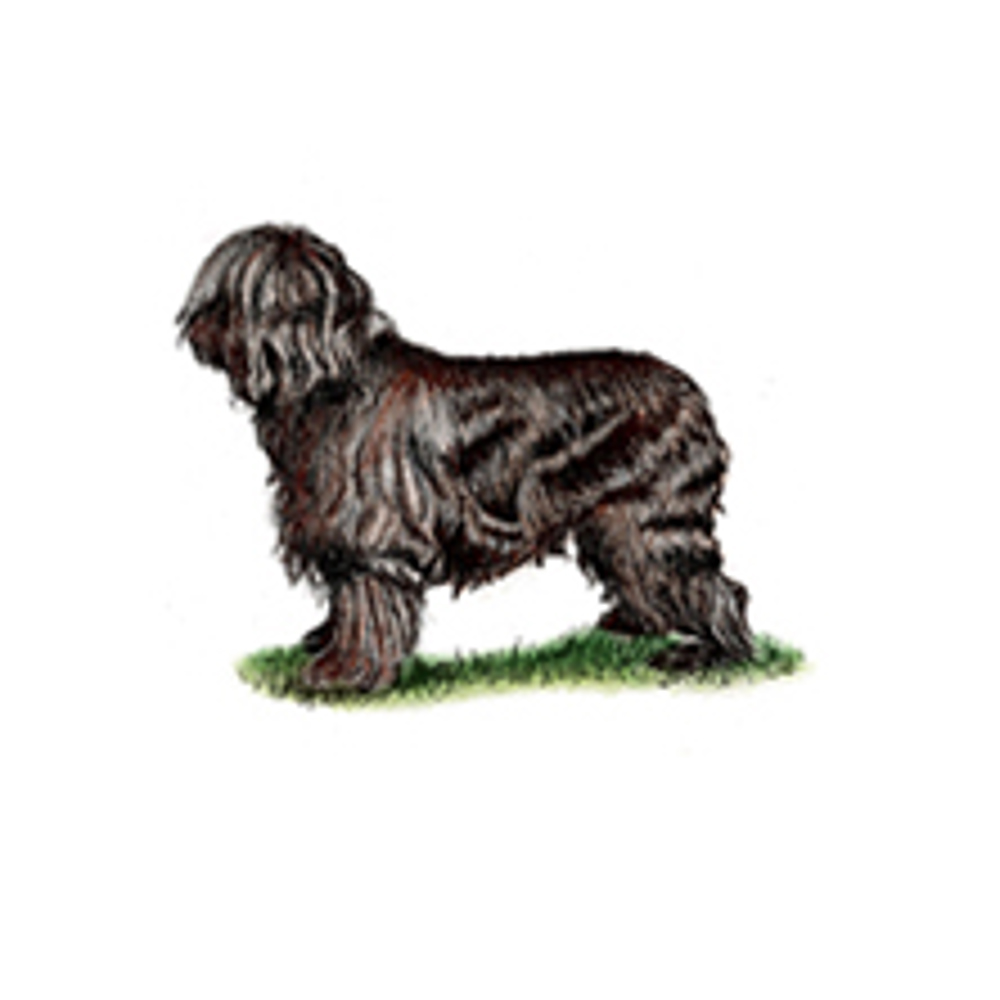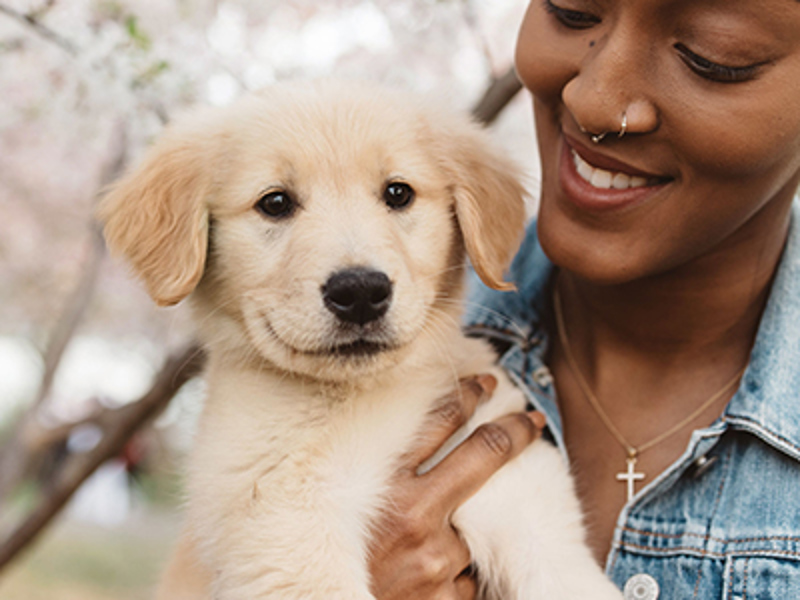
Briard
Breed characteristics
- Size
- Large
- Exercise
- More than 2 hours per day
- Size of home
- Large house
- Grooming
- Every day
- Coat length
- Long
- Sheds
- Yes
- Lifespan
- Over 10 years
- Vulnerable native breed
- No
- Town or country
- Either
- Size of garden
- Large garden
About this breed
This long coated sheep herd and guard dog originates in the province of Brie in France. The breed shares some common ancestry with its short coated 'cousin' the Beauceron and references to the breed can be found in 14th century legends. The Briard was exhibited at the very first dog show in France in 1863 and gained official recognition in 1897. Briards was used in both World Wars by the French army as pack dogs, accompanying search parties looking for wounded soldiers.
Images for this breed
The Pastoral breed group
The Pastoral Group consists of herding dogs that are associated with working cattle, sheep, reindeer and other cloven footed animals.
Usually this type of dog has a weatherproof double coat to protect it from the elements when working in severe conditions. Breeds such as the Collie family, Old English Sheepdogs and Samoyeds who have been herding reindeer for centuries are but a few included in this group.
Colour Watch
Category 0: Breeds with no NBS colour registration options.
Read more about Colour Watch.
Breed Standard colours
Breed standard colour means that the colour is accepted within the breed standard and is a traditional and well-known colour in this breed.
Breed standard colours in this breed include:
- Black
- Fawn
- Slate Grey
Other colour/s
'Other' means you consider your puppy to be a colour not currently known within the breed and one that does not appear on either the breed standard or non-breed standard list. In this instance you would be directed through our registrations process to contact a breed club and/or council to support you on identifying and correctly listing the new colour.
Non-breed-standard colours
Non-breed-standard colour means that the colour is not accepted within the breed standard and whilst some dogs within the breed may be this colour it is advised to only select a dog that fits within the breed standards for all points.
Colour is only one consideration when picking a breed or individual dog, health and temperament should always be a priority over colour.
Health
Whether you're considering buying a Briard puppy or breeding from your dog, it's important to understand the health issues that may affect the breed and how they can be managed or avoided.
Pre-breeding health screening
Good Practice schemes and tests
We strongly recommend that breeders, at a minimum, conduct these tests before breeding, as evidence indicates these conditions are a significant concern in the breed.
Best Practice schemes and tests
These tests address conditions that are still significant for the breed, though they may not be as critical as those listed under Good Practice. They might be less common or newly identified, and research is ongoing to determine their full impact.
To support the breed’s health, responsible breeders should ensure they complete all tests in both categories. Following our Best Practice guidelines means completing both the Good Practice and Best Practice tests for your breed.
- DNA test for congenital sensory night blindness (CSNB) * imported dogs must be tested for this to prevent reintroduction into the UK population. Find a lists of tested dogs here
- Hip testing (for hip dysplasia) using the BVA/KC Hip Dysplasia Scheme
Click here to find out more about The Kennel Club's health standard
Find out about a particular dog's results
Please visit our Health Test Results Finder to discover the DNA or screening scheme test results for any dog on The Kennel Club's Breed or Activity Register.
You can also view the inbreeding coefficient calculation for a puppy's parents, or for a dog you're thinking of breeding from.
DNA testing services
To support your health testing journey, we offer a breed-specific package tailored to your breed's unique health needs. This package provides important information about potential health risks, helping you make informed decisions. Click here to find out more and access the tests relevant to your breed.
Breed health & conservation plan
The Breed Health and Conservation Plans
Our breed health and conservations plans (BHCPs) use evidence and data to help us understand the health issues found in each pedigree dog breed. These plans help breeders and owners identify health and welfare problems and use information, health tests and health schemes to avoid passing on those problems to future puppies. They also support and provide breeders with tools and specialist expertise to help manage genetic diversity, understand the impacts of close breeding, and find the best ways to preserve the population of their breed.
Working together for the breed
We’ve worked with breed clubs and breed representatives to gather all available evidence to help us determine the priority concerns for the breed and decide how we can work together to manage and reduce these problems.
The full evidence base is available at the discretion of the breed clubs, however if you would like to seek access to the full report, please contact our health team.
More about health
If you have any concerns about a particular health condition in your breed then you may wish to speak to your vet or you could contact your breed health co-ordinator.
Breed health co-ordinators are individuals working on behalf of breed clubs and councils who are advocates for the health and welfare of their chosen breed. They acts as a spokesperson on matters of health and will collaborate with The Kennel Club on any health concerns the breed may have.
To contact your breed health co-ordinator please email
Breed watch
Category 1
Currently no points of concern specific to this breed have been identified for special attention by judges, other than those covered routinely by The Kennel Club's breed standard.
Breeding restrictions
There are a number of The Kennel Club's rules and regulations that may prevent a litter from being registered, find out about our general and breed specific breeding restrictions below.
More about breeding
With effect from 6 January 2025, imported Briards and litters from overseas sires will only be eligible for Kennel Club registration if they are proven to be clear or carriers of congenital stationary night blindness (CSNB), or if they have hereditary clear status.
Identified carriers may be used for breeding, provided they are only mated to a Briard that is either hereditarily clear or DNA-tested clear of CSNB.
For litters with overseas sires, the sire must be proven to be either clear or a carrier of the condition.
This scheme has been introduced at the request of the Breed Club(s) to safeguard the UK Briard population from the introduction of this condition.
Looking for a puppy?
Looking for a Briard? Explore our list of puppies and rescue dogs for sale near you.
More information

Need to find out more about a breed?
Use our Find a Club service where you can locate breed clubs that can offer support and advice.

Use our Find a Puppy service
The Kennel Club's Find a Puppy service provides contact details for breeders who have puppies available. Let's help you find your new best friend.

Get the best lifetime pet insurance
At Kennel Club Pet Insurance, we want you to focus on getting the best possible treatment for your dog without worrying about the cost.
